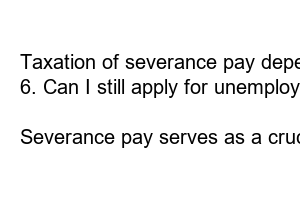퇴직금 조회
Title: Understanding Severance Pay: Your Comprehensive Guide
Introduction:
Severance pay is a term commonly heard, but do you really know what it entails? In this blog post, we will explore the concept of severance pay, its importance, and answer some frequently asked questions. So, let’s dive in and unravel the mysteries of severance pay.
1. What is Severance Pay?
Severance pay refers to the compensation given by an employer to an employee who is being terminated or laid off. It serves as a financial bridge, providing the employee with some financial stability during their transition period.
2. Why is Severance Pay Important?
Severance pay is crucial for employees as it acts as a safety net, ensuring they have time to search for a new job without immediately facing financial difficulties. It offers a sense of security and eases the emotional burden of sudden unemployment.
3. Factors Determining Severance Pay
An employee’s length of service, position within the company, and the company’s severance policy are some of the key factors that determine the amount of severance pay they may receive. While it varies across organizations, severance pay can be based on a set formula tied to the employee’s salary or a negotiated amount.
4. Does Everyone Qualify for Severance Pay?
Severance pay is not legally mandated in most countries, so not everyone is entitled to it. However, many companies voluntarily offer severance packages as part of their employment contracts or to maintain positive employer-employee relations.
5. Tax Implications of Severance Pay
*Severance pay is generally subject to the same taxes as regular wages*, and it may also impact an employee’s eligibility for certain government benefits. Therefore, it is advisable to consult a tax professional to understand the potential tax implications.
6. Negotiating Severance Packages
While severance packages are often established by the employer, there may be room for negotiation. Employees can seek assistance from professional networks, unions, or labor advocacy groups to maximize the benefits they receive.
Frequently Asked Questions:
1. Is severance pay legally required?
No, severance pay is not mandated by law, and it mainly depends on the company’s policies.
2. Will I receive severance pay if I am fired for cause?
In most cases, severance pay is not provided when an employee is terminated due to misconduct or violations.
3. How is severance pay typically paid out?
Severance pay can be paid as a lump sum or in installments over a specified period based on the agreement between the employee and employer.
4. Can I negotiate the terms of a severance package?
Yes, depending on the circumstances, some employers might be open to negotiation.
5. Can severance pay be taxed differently?
Taxation of severance pay depends on the tax regulations in each country, and it is advisable to consult with a tax professional.
6. Can I still apply for unemployment benefits if I receive severance pay?
Severance pay may impact an employee’s eligibility for unemployment benefits, so it is necessary to check with the local government or employment agencies.
Summary:
Severance pay serves as a crucial tool to assist employees during the transition period after job loss. Understanding its importance and knowing the factors that influence its determination can help employees make informed decisions about their financial future. While severance pay is not guaranteed for everyone, it is worth exploring the possibilities and considering negotiation options in order to secure the best outcome.

